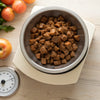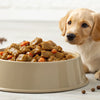Does Wet Food Rot Dogs' Teeth? Understanding the Impact on Dental Health
- Houndsy
Table of Contents
- Introduction
- The Relationship Between Diet and Dental Health
- How to Maintain Your Dog's Dental Health
- The Houndsy Kibble Dispenser: Elevating the Feeding Experience
- Conclusion
Introduction
As devoted pet owners, we always aim to give our four-legged friends the best in terms of nutrition and care. Among the many questions that arise in pet ownership, one particularly pressing query is: does wet dog food rot dogs' teeth? With a staggering 80% of dogs exhibiting signs of dental disease by the age of three, understanding the role of diet in maintaining our pets' oral health is of paramount importance. In today’s blog post, we’ll unravel the intricate relationship between wet dog food and dental health, providing insights and practical strategies to ensure our dogs maintain not only a hearty appetite, but also a healthy smile.
By the end of this article, you will explore the myths and realities surrounding wet dog food, learn about effective dental care practices, and discover how the Houndsy Kibble Dispenser can enhance your daily feeding routine while promoting your pet's well-being. So, let’s dive in and consider the implications of wet food on your dog’s dental health.
The Relationship Between Diet and Dental Health
Understanding Periodontal Disease
The foundation of good dental health starts with understanding periodontal disease, which begins with the formation of plaque—the sticky biofilm of bacteria that forms on your dog’s teeth. If plaque is not removed, it hardens into tartar, leading to gum inflammation (gingivitis) and potentially severe dental issues. The primary factors influencing periodontal disease include:
- Plaque Buildup: Plaque accumulates on all teeth, regardless of diet, but certain foods can either promote or hinder this buildup.
- Tartar Formation: Tartar can only be removed through professional dental cleaning, emphasizing the need for preventive care.
- Gum Health: Healthy gums are critical for overall oral health and can be influenced by the type of diet and dental practices employed.
Dry vs. Wet Dog Food: A Closer Look
The long-standing debate between wet and dry dog food often centers on dental health. Many pet owners assume dry food helps clean teeth due to its texture, but recent studies suggest this benefit may be overstated.
Research Insights
- Bacterial Growth: Studies indicate that wet food can become trapped between teeth, fostering bacterial growth contributing to plaque if good dental hygiene is not maintained.
- Chewing Action: While dry food may promote chewing, the effectiveness largely depends on the kibble's size and texture. Some dogs may swallow dry food whole, eliminating potential dental benefits.
- Dietary Composition: The carbohydrate content in both wet and dry foods impacts dental health. Foods rich in carbohydrates can adhere to teeth, leading to decay. Regular brushing is crucial regardless of diet.
The Myths Surrounding Wet Dog Food
Let’s debunk some common myths:
-
Myth 1: Wet food is inherently detrimental to dogs' teeth.
- Reality: While wet food can contribute to plaque, it is not the leading cause of dental problems. Regular dental hygiene is key.
-
Myth 2: Only dry food can prevent tooth decay.
- Reality: The texture's impact is limited; maintaining oral hygiene through brushing and dental chews is far more vital.
-
Myth 3: Dogs will refuse food if they have dental pain.
- Reality: Dogs often hide discomfort and may continue eating despite significant dental issues.
How to Maintain Your Dog's Dental Health
Regular Dental Checkups
Just like ourselves, our pets benefit from routine dental evaluations. Veterinarians can spot early signs of periodontal disease and recommend suitable preventive measures or treatments.
Daily Brushing
Daily tooth brushing is the gold standard for dental care, using a dog-specific toothpaste to help eliminate plaque before it hardens into tartar. While it may seem daunting initially, many dogs can learn to tolerate regular brushing with a little patience.
Dental Chews and Toys
Incorporating dental chews and toys into your dog's everyday routine can aid in mechanically cleaning their teeth. Chewing helps dislodge plaque while promoting gum health. Look for products with the Veterinary Oral Health Council seal, ensuring proven efficacy in improving dental health.
Balanced Diet
Selecting a balanced diet is essential. Regardless of your choice between wet and dry food, ensure it meets your dog's nutritional requirements and avoid fillers.
The Houndsy Kibble Dispenser: Elevating the Feeding Experience
At Houndsy, we are dedicated to enhancing the dog-feeding experience with innovative design and functionality. Our flagship product, the Houndsy Kibble Dispenser, exemplifies our commitment to combining convenience with aesthetics.
Key Features of the Houndsy Kibble Dispenser
- Perfect Portion Control: Our dispenser provides accurate portion sizes, helping you manage your dog’s weight and prevent overeating.
- Convenient Design: Featuring an ergonomic crank at standing height, it eliminates the need for bending during feeding, making the process easier for pet owners.
- Quality Materials: Constructed from high-quality, BPA-free materials, our dispenser keeps your dog’s food fresh.
- Stylish Aesthetics: Our mid-century modern design complements any home decor, making it a striking addition to your space.
Integrating the Houndsy Kibble Dispenser into your feeding routine allows for stress-free feeding while promoting your dog's well-being. Explore the Houndsy Kibble Dispenser here to transform your pet care experience.
Conclusion
While wet dog food can contribute to plaque accumulation, it is not the sole reason behind tooth decay. The crux of maintaining your dog's oral health lies in a holistic approach that includes regular dental care, a balanced diet, and excellent feeding practices.
We encourage you to reflect on your dog’s feeding routine—consider how you can enhance it for better dental health. By staying informed and proactive in our pet care choices, we can ensure our beloved companions live long, healthy, and happy lives.
FAQ
-
Can wet dog food cause tooth decay?
- Wet dog food can contribute to plaque buildup but is not solely responsible for tooth decay. Maintaining good dental hygiene, including regular brushing and veterinary checkups, is essential.
-
How often should I brush my dog's teeth?
- Ideally, brush your dog’s teeth daily. If daily brushing isn't feasible, aim for at least a few times a week.
-
Are dental chews effective?
- Yes, dental chews can help reduce plaque and tartar buildup when used alongside regular brushing and veterinary care.
-
Is it better to feed my dog wet food or dry food?
- Both wet and dry foods have their advantages and disadvantages. The best choice depends on your dog's specific needs and preferences. Consult your veterinarian for personalized recommendations.
-
How can the Houndsy Kibble Dispenser assist in my dog's feeding routine?
- The Houndsy Kibble Dispenser offers perfect portion control, convenience, and stylish design, all aimed at enhancing the daily feeding experience for you and your dog.
Order now to simplify your pet care routine while promoting your dog's health and happiness—get the Houndsy Kibble Dispenser today!













